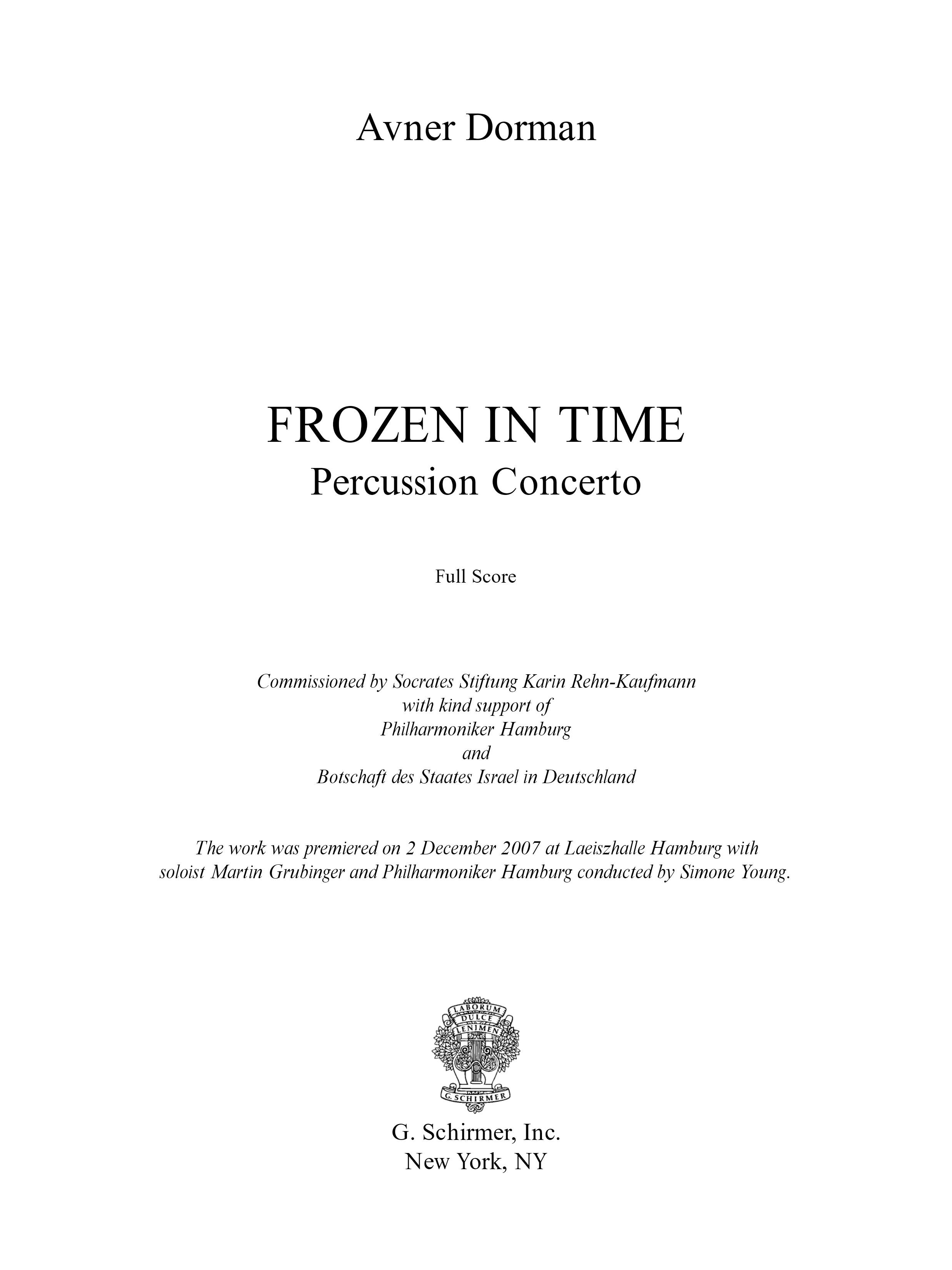
Instrumentation:
3 Flutes (3rd doubling Piccolo)
2 Oboes
3 Clarinet in B (2nd doubling E , 3rd doubling Bass Clarinet)
Alto Saxophone in E
Tenor Saxophone in B
2 Bassoons
4 Horns in F
3 Trumpets in B (1st doubling Trumpet in D)
2 Trombones
Bass Trombone
Tuba
2 Timpani*
Percussion (2 players)
Celesta
Piano Harp
Solo Percussion
Violin I
Violin II
Viola Violoncello Contrabass
*N.B.: Frozen in Time calls for two timpani players. The timpany should be placed at the opposite sides of the stage. They do not need to be far from each other or at the extreme sides of the stage, but they should NOT be placed both at stage right or both at stage left. When both sets of timpani are called for, a stereo effect needs to be achieved.
duration ca. 25 minutes
Performancenotes:
1.Glissandi–
a.Stringglissandishouldbeperformedcontinuouslythroughoutthedurationofthepitchoforigin(they shouldnotbedelayed).Thisisalsotruewhentheglissandoencompassestiednotes b.Hornglissandimaybedelayed.
2.InmovementsIandIII,staccatoeighthsshouldbeperformedas16thnotesfollowedbya16threst.Asageneral ruleitispreferabletointerpretarticulationsaspartofarhythmicpattern(i.e.,tomakethegrooveclear)rather thanasexpressiveindications.
shouldbeperformedas shouldbeperformedas
Wherethereareseriesofaccentedshortnotes(seebelow)staccato8thsandstaccato16thsshouldbeperformedas 16thsorabitshorter.Ichosetouse8thswhereverpossibletosimplifythereadingoftherhythmicpatternsand clarifywherebeatsfall.
shouldbeperformedas
ProgramNote:
ThetitleFrozeninTimereferstoimaginarysnapshotsoftheearth’sgeologicaldevelopmentfromprehistorictimestothepresentday.Although wecannotbesurewhattheearthlookedlikemillionsofyearsago,mostscientistsagreethattheseparatecontinentsusedtobeonemegacontinent(asmostagreethatmankinddescendedfromoneprehistoricwomb).Eachmovementimaginesthemusicofalargeprehistoric continentatacertainpointintime:
1.Indoafrica–Thepieceopenswithagrandgesture,likeanavalanche,thatisfollowedbya“timefreeze.”Themainthemeofthefirst movementisbasedonSouthIndianrhythmcycles(Talas)andscales.Therangeofthethemeisgraduallyexpandedlikeaspiral,asit wouldinclassicalIndianimprovisation.ThesecondthemeisbasedontheinnerrhythmoftheTala,whichisalsofoundinsome traditionsofWest-Africanmusic.AsthesolopercussioniststartsplayingthethemeontheMarimbaandtheCencerros(akeyboardof cowbells),itbecomesmoresimilartoGamelanmusicofSoutheastAsia.Thesoloistthenreturnstothedrum-setandtakesthemusic backtoitAfricanoriginsbuildingthemovementuptoanecstaticculmination.Atthispoint,theopeningavalanchereturnsasaburst ofemotionsratherthananaturalphenomenon.Afterashortcadenza,themovementwrapsupwithafuguethatrecapsthethemesof theopeningsection.
2.Eurasia–Thesecondmovementisanexplorationofthedarkersidesofthemega-continentofEurasiawhereemotionsrundeepbutare keptquiet(themovementmainlydealswiththetraditionsofcentralEuropeandcentralandeasternAsia).Theopeningbassdrum rhythm(whichisborrowedfromtheSiciliana)andthelonghighnotesinthestringsseparatethismovementfromtheouteronesin termsofgeographyandclimate.Also,thefactthatthesoloistonlyusesmetalinstrumentsinthismovementmakesitcolderandmore northernincharacter.ThemelodicmaterialsofthismovementareinspiredbyMozart’sSicilianaswhichappearinsomeofhismost intimateandmovingmovements(PianoConcertoK.488,SonataK.280,RondoK.511andtheariaAchIchFuhl’s).Onecanhearthat warisbrewingunderthesurfacethroughoutthemovementalthoughitonlyeruptsbrieflyintheformofcentralAsianbellsandmodes thatinvadetheintrospectivemoodoftheSiciliana.Themovementendswithalongmeditationontheopeningtheme–withmany momentsfrozenintime.
3.TheAmericas–Thefinalmovementisasnapshotofthepresent(TheAmericasare,infact,stillonecontinent).Moreover,themixture ofculturesisastapleofmodernAmerica.Thefinalmovementisconstructedasarondo.TherefrainrepresentsmainstreamAmerican styles(Broadwayatfirst,AmericanSymphonicstyleinitssecondrepeat,MellowJazzinthethird,andGrungeMusic–SeattleStyle Rock-initsfinalrepeat).TheepisodicsectionsexploreothersoundsoftheAmericas:theTango,AfroCubanJazz,Swing,andMinimalism. AsAmericanmusicisbynatureinclusive,themovementincludesarecapitulationofAfrican,EuropeanandAsianmusic,tyingthe piecetogether.
—AvnerDorman
FROZEN IN TIME
1. Indoafrica
Avner Dorman (2007)
